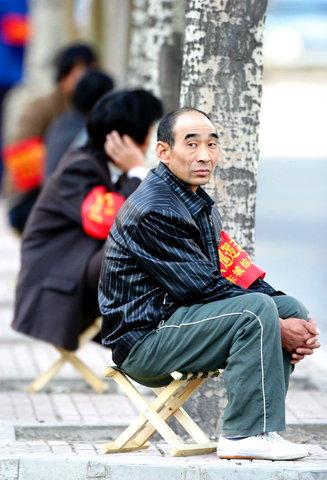Billboards of elephants, giraffes and sweeping African savannas are covering Beijing. Police have had holidays canceled to help ease gridlock in the capital. Conference centers are being carpeted with grass.
Beijing is making unusually lavish efforts to welcome leaders and officials from 48 African nations this week for a landmark summit meant to highlight China's huge and growing role in Africa.
Over the past decade, China has built an outsized presence in Africa, in a diplomatic and economic push that is helping to reshape the geopolitical map. Trade has ballooned by tenfold to US$40 billion last year. Chinese investment has funded roads and been poured into copper mines and oil fields, helping to boost African economies and, for some, standards of living.

PHOTO: EPA
"China is the biggest developing country and Africa is a continent where the most developing countries are situated," said He Wenping, (
In this exchange, China is picking up natural resources -- oil, precious minerals -- to feed its expanding economy and new markets for its burgeoning enterprises. The African countries get investment and both parties are building political alliances in a world they often see as overly dominated by the US and other Western powers.
But China's African adventure is not friction-free. African workers have protested against what they see as ill-treatment and poor pay by Chinese companies, as well as the flood of Chinese workers who take away their jobs. South Africa, a staunch friend of Beijing, has complained that influxes of cheap Chinese clothes could devastate the textile industry.
In Zambia, a decades-old political ally, China became an issue in the September presidential election, with the opposition candidate questioning the benefit from Chinese investment. In July, scores of African workers at a Chinese-owned Zambian mine rioted over low wages.
There's a "growing perception that China's interests in Africa are very self-serving, if not predatory, that China is interested in making inroads into markets that are good for its energy needs -- especially with countries that are not paragons of democratic virtue," said Garth le Pere of the Institute for Global Dialogue, a think tank based in Midrand, South Africa.
The World Bank and IMF have raised concern that freely lavished Chinese aid money is compounding Africa's debts. China's exports of oil from Angola, seen as one of Africa's most corrupt governments and Sudan, among the most repressive governments, have raised alarms from human rights and good governance groups.
Critics also have said that China's arms exports to Sudan's Darfur region have helped fuel the conflict, which has claimed at least 180,000 lives and forced more than 2 million people from their homes over the past three years.
Chinese officials, however, insist that their country's involvement has improved the lives of ordinary Africans without political meddling -- strict adherence to China's diplomatic policy of noninterference.

Kehinde Sanni spends his days smoothing out dents and repainting scratched bumpers in a modest autobody shop in Lagos. He has never left Nigeria, yet he speaks glowingly of Burkina Faso military leader Ibrahim Traore. “Nigeria needs someone like Ibrahim Traore of Burkina Faso. He is doing well for his country,” Sanni said. His admiration is shaped by a steady stream of viral videos, memes and social media posts — many misleading or outright false — portraying Traore as a fearless reformer who defied Western powers and reclaimed his country’s dignity. The Burkinabe strongman swept into power following a coup in September 2022

‘FRAGMENTING’: British politics have for a long time been dominated by the Labor Party and the Tories, but polls suggest that Reform now poses a significant challenge Hard-right upstarts Reform UK snatched a parliamentary seat from British Prime Minister Keir Starmer’s Labor Party yesterday in local elections that dealt a blow to the UK’s two establishment parties. Reform, led by anti-immigrant firebrand Nigel Farage, won the by-election in Runcorn and Helsby in northwest England by just six votes, as it picked up gains in other localities, including one mayoralty. The group’s strong showing continues momentum it built up at last year’s general election and appears to confirm a trend that the UK is entering an era of multi-party politics. “For the movement, for the party it’s a very, very big

ENTERTAINMENT: Rio officials have a history of organizing massive concerts on Copacabana Beach, with Madonna’s show drawing about 1.6 million fans last year Lady Gaga on Saturday night gave a free concert in front of 2 million fans who poured onto Copacabana Beach in Rio de Janeiro for the biggest show of her career. “Tonight, we’re making history... Thank you for making history with me,” Lady Gaga told a screaming crowd. The Mother Monster, as she is known, started the show at about 10:10pm local time with her 2011 song Bloody Mary. Cries of joy rose from the tightly packed fans who sang and danced shoulder-to-shoulder on the vast stretch of sand. Concert organizers said 2.1 million people attended the show. Lady Gaga

SUPPORT: The Australian prime minister promised to back Kyiv against Russia’s invasion, saying: ‘That’s my government’s position. It was yesterday. It still is’ Left-leaning Australian Prime Minister Anthony Albanese yesterday basked in his landslide election win, promising a “disciplined, orderly” government to confront cost-of-living pain and tariff turmoil. People clapped as the 62-year-old and his fiancee, Jodie Haydon, who visited his old inner Sydney haunt, Cafe Italia, surrounded by a crowd of jostling photographers and journalists. Albanese’s Labor Party is on course to win at least 83 seats in the 150-member parliament, partial results showed. Opposition leader Peter Dutton’s conservative Liberal-National coalition had just 38 seats, and other parties 12. Another 17 seats were still in doubt. “We will be a disciplined, orderly